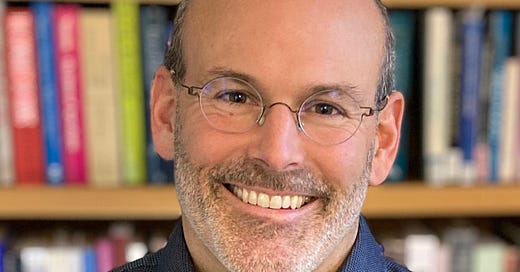Unwinding Self-Addiction, with Dr. Jud Brewer | Flourishing After Addiction #41
"I’ve never found a case where I was taking something personally and wasn’t suffering."
What if self itself is a habit? In this episode, psychiatrist and neuroscientist Dr. Jud Brewer explores how struggles like addiction, anxiety, and even identity can be understood as habit loops shaped by reward and reinforcement. Drawing from neuroscience, contemplative practice, and clinical work, Jud offers a practical approach to unwinding those loops and reducing suffering.
Check out our conversation here: (here’s the audio directly embedded in Substack…)
And as always, you can also listen to this episode on your favorite podcast player, or wherever you get your podcasts.
Jud is a colleague I deeply respect: someone who’s helped me quite a lot to better understand contemplative science within the framework of addiction medicine. We don’t agree about everything, as you’ll hear in this conversation, but overall, I look up to him as a kindred spirit and as someone who’s sincerely committed to reducing the suffering of addiction with rigor and integrity. We’ve discussed his model of habit loops and behavioral change in a previous episode, which is well worth a listen.
In this episode, we go deep on self-control and everyday addictions. Jud builds on his framework to further discuss how explain how awareness rather than willpower is the key to enduring change. We discuss how habits form, why “selfing” can become addictive, and how to actually practice letting go. We take on big questions about agency and choice, challenge common models of addiction, and explore how those topics inform an exploration of what it means to flourish.
Enjoy, and let me know what you think.
Jud Brewer, MD, PhD (“Dr. Jud”), is a New York Times best-selling author and a leading authority on habit change and the science of self-mastery. With over 25 years of mindfulness training combined with scientific research, he serves as the Director of Research and Innovation at the Mindfulness Center and as a professor at Brown University. Jud has developed innovative mindfulness programs—both in-person and app-based—for smoking cessation, emotional eating, and anxiety. He has trained U.S. Olympic athletes, coaches, and foreign government ministers. His work has been featured on “60 Minutes,” TED, The New York Times, and more. He also co-founded Mindshift Recovery, a nonprofit aiding those suffering from addiction, and College Journey.AI, which helps high school students navigate the stress of college applications. He is the author of The Craving Mind (Yale University Press, 2017), the New York Times bestseller Unwinding Anxiety (Avery/Penguin Random House, 2021), and The Hunger Habit (Avery/Penguin Random House, 2024). For more information, visit www.drjud.com.
If you’re finding this newsletter useful, please consider sharing this episode with someone else you think would benefit.
In this episode:
· Mindshift Recovery – Jud’s nonprofit offering accessible, evidence-based tools for habit change and addiction recovery (we’ll discuss this on a future bonus episode!)
· Bob Newhart’s “Stop It” sketch
· Cortland Dahl’s book – A Meditator’s Guide to Buddhism
· about the Rescorla–Wagner model of learning and reward, influential in reinforcement learning research




There are many ‘sober’ people who still believe that addiction often originates from a bout of boredom or simple recklessness, where a person consumed recreationally but became heavily hooked on a substance that eventually destroyed their life and by extension even the lives of loved-ones.
In the book (WHAT HAPPENED TO YOU?: Conversations on Trauma, Resilience and Healing) he co-authored with Oprah Winfrey, Dr. Bruce D. Perry (M.D., Ph.D.) writes in regards to self-medicating trauma, substance abuse and addiction:
“But here’s what’s interesting about drug use: For people who are pretty well-regulated, whose basic needs have been met, who have other healthy forms of reward, taking a drug will have some impact, but the pull to come back and use again and again is not as powerful. It may be a pleasurable feeling, but you’re not necessarily going to become addicted. Addiction is complex. But I believe that many people who struggle with drug and alcohol abuse are actually trying to self-medicate due to their developmental histories of adversity and trauma.”
Decades ago, I, while always sympathetic, also looked down on those who had ‘allowed’ themselves to become addicted to hard drugs or alcohol. Although I’ve not been personally or familially affected by the opioid overdose crisis, I have suffered enough unrelenting PTSD symptoms to have known, enjoyed and appreciated the great release upon consuming alcohol or THC.
The unfortunate fact about self-medicating is: the greater the induced euphoria or escape one attains from it, the more one wants to repeat the experience; and the more intolerable one finds their non-self-medicating reality, the more pleasurable that escape will likely be perceived. In other words: the greater one’s mental pain or trauma while not self-medicating, the greater the need for escape from one's reality — all the more addictive the euphoric escape-form will likely be.
When substance abuse is due to past formidable mental trauma, the lasting solitarily-suffered turmoil can readily make each day an ordeal unless the traumatized mind is medicated. Not surprising, many chronically addicted people won’t miss this world if they never wake up.
Regardless, societally neglecting, rejecting and therefore failing people struggling with crippling addiction should never be an acceptable or preferable political, economic or religious/morality option. They definitely should not be consciously or subconsciously perceived by sober society as somehow being disposable. Too often the worth(lessness) of the substance abuser is measured basically by their ‘productivity’ or lack thereof. They may then begin perceiving themselves as worthless and accordingly live and self-medicate their daily lives more haphazardly.
Meantime, substance abuse, addictions and addicts are still largely perceived by ‘sober’ society as being products of weak willpower and/or moral crime. At the same time, pharmaceutical corporations have intentionally pushed their own very addictive and profitable opiate resulting in immense suffering and overdose death numbers — indeed the real moral crime! — and got off relatively lightly and only through civil litigation.